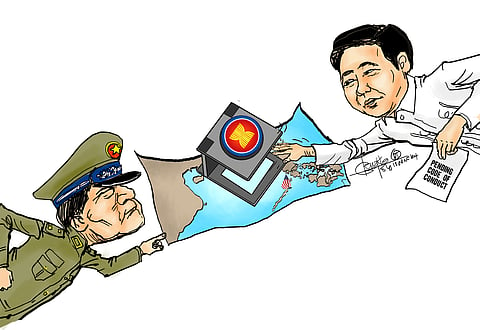
- NEWS
- the EDIT
- COMMENTARY
- BUSINESS
- LIFE
- SHOW
- ACTION
- GLOBAL GOALS
- SNAPS
- DYARYO TIRADA
- MORE

President Ferdinand “Bongbong” Marcos Jr. and a People’s Liberation Army (PLA) general recently crossed swords over ASEAN centrality during the 21st IISS Shangri-La Dialogue in Singapore.
The Association of Southeast Asian Nations (ASEAN) has targeted 2030 for the full integration of the economies of its 10 member nations — Brunei Darussalam, Burma, Cambodia, Indonesia, Laos, Malaysia, Singapore, Thailand, Vietnam, and the Philippines.
The issue of centrality brought the importance of the economic community, of which the Philippines is part, to the forefront of discussions during the annual defense forum.
The Chinese officer suggested that President Marcos had violated the centrality principle by leaning on the United States and other Western allies in addressing the West Philippine Sea conflict.
In response, Mr. Marcos deftly said the Philippines abides by the norm observed in the regional bloc.
He reminded China, through the PLA brass, about the Asian giant’s efforts to influence the nations that comprise the bloc.
“And if there have been distractions in the recent past, it’s time to return and to remember the core principles of ASEAN’s establishment aimed at advocating the common interests of nations and partnerships at the multilateral level,” he said.
He stressed that the Philippines has remained true to the principles upon which ASEAN was founded.
The ASEAN idea of community embodies centrality in which decisions are guided by the tedious method of consensus where all of the members must agree before a decision is made.
China has exploited this slow process to keep a stranglehold on ASEAN in order to advance its objectives in the region.
Beijing, thus, brandishes centrality in its arsenal of arguments to keep Western nations out of the region since the concept is globally recognized.
Following US Vice President Kamala Harris’ visit to Jakarta to attend the 2023 ASEAN Summit, Washington declared its commitment to uphold ASEAN centrality. ASEAN’s partners, such as the European Union, also declared their support for it.
Among the products of the centrality process is the two-decade-old negotiations between ASEAN and China to craft a Code of Conduct that will bind signatories to the ways to address the overlapping claims on the South China Sea.
Thus, Marcos hinted at a need to adjust the ASEAN way.
“Many of these things we no longer speak of today but we must because they are as relevant today as they ever were, perhaps even more so because the global situation is a great deal more complicated than it used to be,” the President said.
He noted that most of the issues that members of the bloc and nations in the region face are of global concern.
“There is no such thing as a regional issue any longer. We have all experienced the unexpected effects of the war in Ukraine, of the conflict in the Middle East,” he said.
The maritime dispute, he said, must be addressed with global participation since the disputed area is where half of global trade passes through.
Peace and stability in the South China Sea and the freedom of navigation are world issues, Marcos pointed out.
The President is calling on ASEAN to reexamine its priorities since it has the potential to be a force to reckon with in the face of expansive actions in the region.
ASEAN being a cohesive bloc will be the best argument for self-determination in the region that China has also been drumming up but to the wrong tune.
